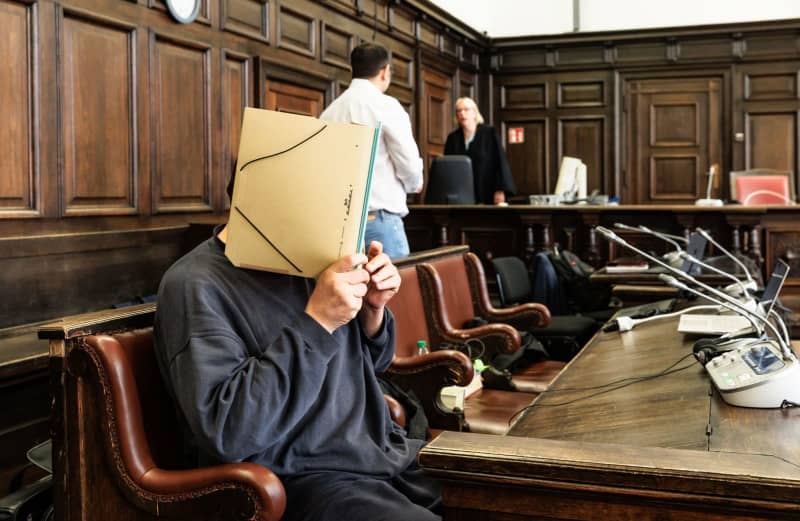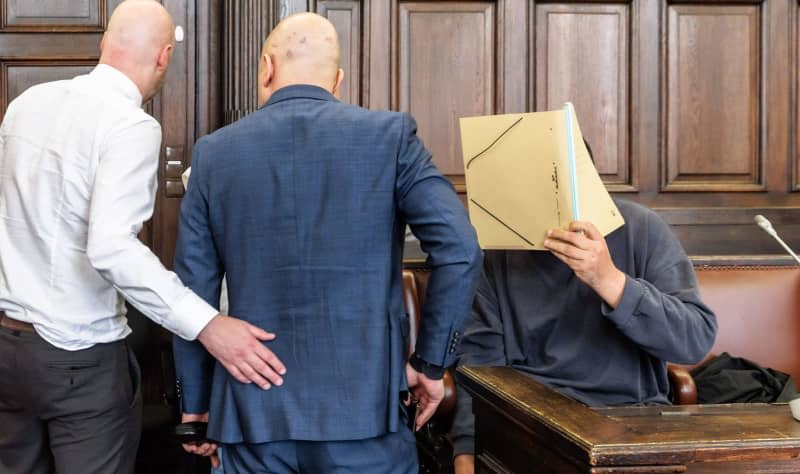Trial begins in Hamburg of alleged head of Syrian government militia

The trial of a 47-year-old Syrian man began on Friday in the northern German port city of Hamburg in relation to potential war crimes committed by a Syrian government militia between 2012 and 2015.
The accused is a 47-year-old Syrian man who entered Germany in February 2016 and was detained in the north-western city of Bremen on August 2 last year, according to a spokesman for the Hanseatic Higher Regional Court.
At the start of proceedings, the man's defence lawyers complained to presiding judge Norbert Sakuth that their client had not been able to dress properly. The accused, dressed in baggy grey clothes and slippers, was then allowed to return to the remand prison and change his clothes. The trial began two hours late.
As one of the leaders of the Shabiha militia in the al-Tadamon district of the Syrian capital, the accused is alleged to have participated in the abuse and enslavement of civilians as well as looting.
The militia allegedly detained people arbitrarily at checkpoints in Damascus to extort ransoms, make them perform forced labour or torture them.
The militia, in cooperation with a branch of the military secret service, is believed to have used violence to suppress opposition efforts.
According to the federal prosecutor's office, in September 2013, a civilian was tied up and blindfolded and taken to a prison. In a cell, the accused is said to have beat him in the face and ordered his subordinates to beat the man with plastic pipes for hours.
When he fell to the floor, one of the militiamen kicked his head so hard that he hit the wall and suffered a bleeding laceration, the prosecution says. The reason for the abuse was that the man had demanded money from the accused's family for workmen's services.
In other cases, the militia took civilians prisoner and forced them to carry sandbags to the front line. In the process, the prisoners came under fire. In addition, they were not provided with food and water, the prosecution says.
The accused knocked one man to the ground during the arrest, it alleges, adding that he then kicked the civilian, grabbed him by the hair and pushed his head onto the pavement.
The Shabiha militia, in co-operation with a branch of the military intelligence service, was believed to have suppressed opposition efforts by force. According to the federal prosecutor's office, members of this intelligence unit killed at least 47 civilians in mass executions on April 16 and October 16, 2013.
There are video recordings of the massacres in which the person allegedly responsible can be seen, the court spokesman said.
Another video shows this secret service employee together with the accused on a wheel loader. The recordings helped the investigators to identify the 47-year-old. However, they did not prove that the accused had taken part in the massacres.
The federal prosecution has charged the accused with 21 counts of crimes against humanity and war crimes. During the arraignment, the two prosecutors emphasized that all fighting parties in the Syrian civil war had committed the most serious violations of international humanitarian law since the end of 2011.
After the indictment was read out, the 47-year-old stated that he would possibly comment on the allegations at a later date.
His two defence lawyers demanded that important witnesses for the prosecution be named and given their place of residence. Otherwise, they requested that the trial be suspended. The State Security Senate rejected this.
The Syrian military intelligence service had established a "regime of terror," and the witnesses and their relatives in Syria and other countries would be in acute danger if their names were mentioned, explained Judge Sakuth.
The trial in Hamburg is not the first trial in Germany for human rights crimes committed by Syrian government forces. At the beginning of 2021, the Koblenz Higher Regional Court sentenced a former chief interrogator in a Damascus prison to life imprisonment.
The court was convinced that he was responsible for the torture of at least 4,000 people and the deaths of 27 people.
A co-accused intelligence officer was sentenced to four and a half years in prison in February 2021 for aiding and abetting a crime against humanity.


